

7 Essential Tips for Finding ESA Apartments
by Lena Park
Last updated: July 11, 2025
Verified and Approved by:
Angela Morris,
MSW, LCSW
Fact Checked

Overview
The primary aim of the article titled “7 Essential Tips for Finding ESA Apartments” is to offer heartfelt guidance to those in search of apartments that welcome emotional support animals (ESAs). It acknowledges the emotional struggles faced by individuals with mental health challenges, highlighting the significance of understanding their legal rights under the Fair Housing Act. The article encourages readers to gather the necessary documentation and to communicate effectively with landlords, thereby enhancing their chances of securing suitable housing for themselves and their beloved ESAs. By addressing these concerns with compassion, the article serves as a supportive resource for individuals navigating this journey.
Introduction
Navigating the complexities of finding suitable housing for emotional support animals (ESAs) can feel overwhelming, particularly for those facing mental health challenges. It’s important to recognize the emotional weight of this journey. With the right knowledge and resources, however, this path can become significantly more manageable.
This article offers essential tips designed to empower you in securing ESA-friendly apartments while also helping you understand your rights under the Fair Housing Act.
How can you effectively navigate the often convoluted landscape of ESA housing, ensuring that your emotional companion is welcomed without unnecessary barriers? Your feelings and concerns are valid, and support is available to guide you through this process.
Wellness Wag: Streamlined ESA Letter Acquisition for Housing
Navigating the challenges of mental health can be overwhelming, especially when it comes to securing the right accommodations for emotional support. Many individuals face urgent housing dilemmas, feeling the weight of anxiety and uncertainty. This is where Wellness Wag steps in, streamlining the process of obtaining an ESA letter for esa apartments with care and efficiency. Clients can expect to receive their documentation within just 24 hours after a brief assessment and consultation with licensed professionals.
This swift transition to esa apartments is not just a convenience; it is essential for those grappling with urgent accommodation challenges, allowing them to assert their rights under the Fair Housing Act. By leveraging the expertise of certified medical professionals, Wellness Wag ensures that clients receive legitimate ESA letters that comply with legal standards. This compliance is crucial in enabling access to esa apartments that cater to their emotional assistance animals.
Did you know that over 70% of pet owners are unaware they qualify for an ESA? This service not only alleviates stress but also empowers individuals to focus on finding homes that meet their needs without the burden of pet-related fees, such as deposits and monthly rents. As mental health experts affirm, ‘ESA letters offer crucial affirmation for individuals, enabling them to obtain accommodations that address their mental health requirements.’
Moreover, Wellness Wag is deeply committed to maintaining the privacy of client health information, adhering to HIPAA regulations. To begin the journey of obtaining an ESA letter, clients can easily visit Wellness Wag’s website and complete a brief eligibility assessment. Start your ESA registration today, and take the first step towards ensuring you have the support you need.
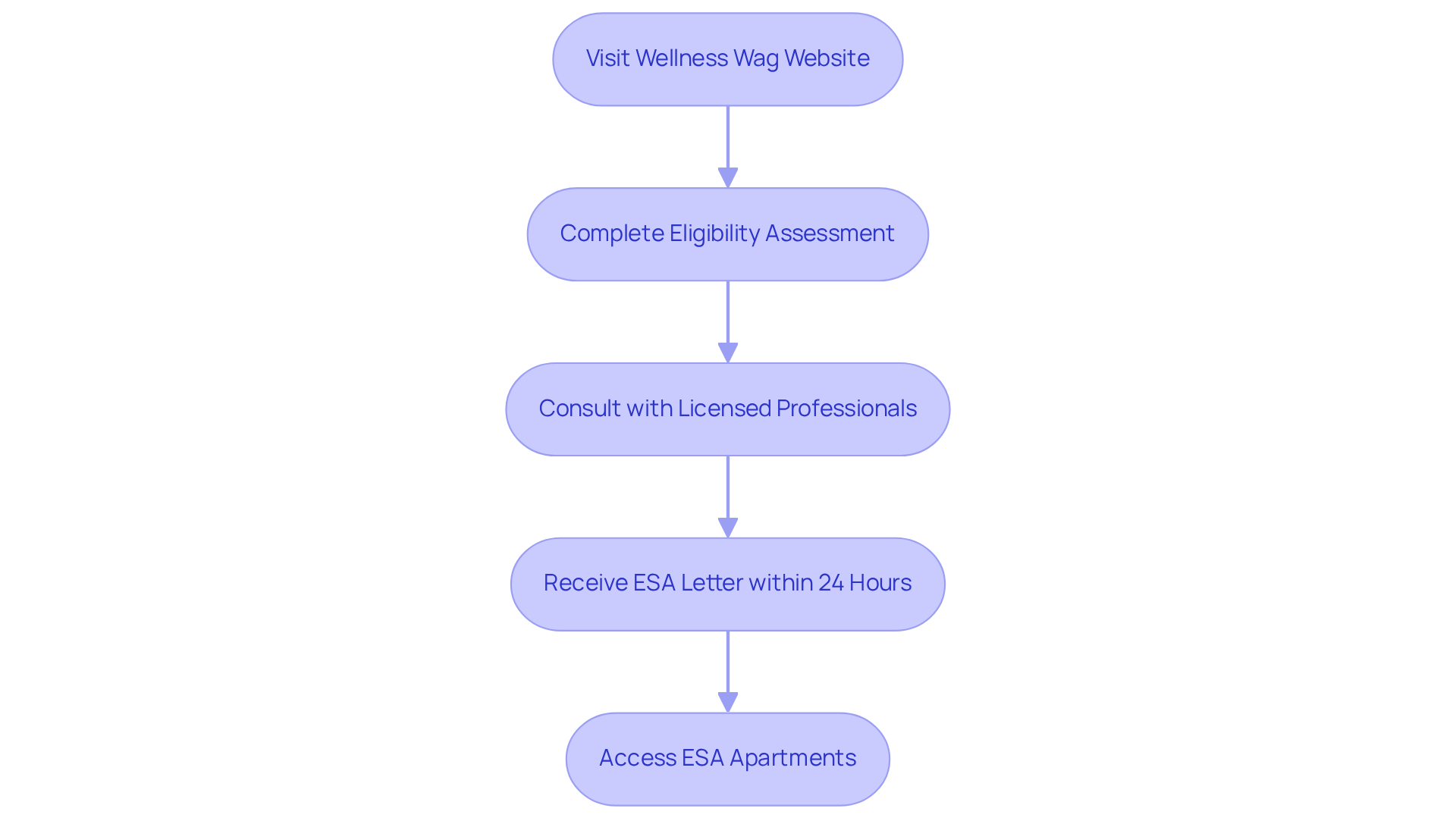
Understand the Fair Housing Act and Your Rights
The Fair Housing Act (FHA) serves as a vital safeguard for individuals with disabilities, allowing them to live alongside their emotional support animals (ESAs) in environments that may otherwise impose pet restrictions. This legislation holds particular significance for those in search of ESA apartments, as it explicitly prohibits landlords from denying residency based solely on a tenant’s documented need for an ESA. To validate this need, proper documentation, typically an ESA letter from a licensed mental health professional, is essential.
Understanding these rights can alleviate the stress associated with finding suitable accommodation. For example, landlords cannot impose additional pet fees or deposits for ESAs, nor can they demand detailed medical records or diagnoses from tenants. This protection is especially crucial for individuals who may face discrimination due to their mental health conditions.
Recent statistics reveal an increase in cases of accommodation discrimination related to ESAs, underscoring the importance of awareness and advocacy. Tenants who are informed about their rights under the FHA are better positioned to navigate potential challenges. Experts highlight that many ESA owners may not recognize their rights are being compromised until it is too late, emphasizing the need for vigilance and a thorough understanding of the law.
Moreover, it is important for ESA owners to renew their letters annually to ensure compliance with accommodation requirements and to prevent any potential conflicts with landlords. Unlike service dogs, which are trained to perform specific tasks, ESAs provide essential emotional support, particularly in university housing, fostering equal opportunities for individuals to fully enjoy their residential experience.
Key Differences Between ESAs and Service Dogs:
- Certification: Service dogs must be trained and certified, while ESAs do not have such requirements.
- Public Access Rights: Service dogs enjoy full public access rights under the Americans with Disabilities Act (ADA), whereas ESAs do not possess the same access rights in public spaces.
In conclusion, the FHA provides crucial protections for ESA apartments, ensuring owners can live with their companions without facing unnecessary barriers. Familiarizing oneself with these rights not only empowers tenants but also promotes a more inclusive environment for individuals in need of emotional support.
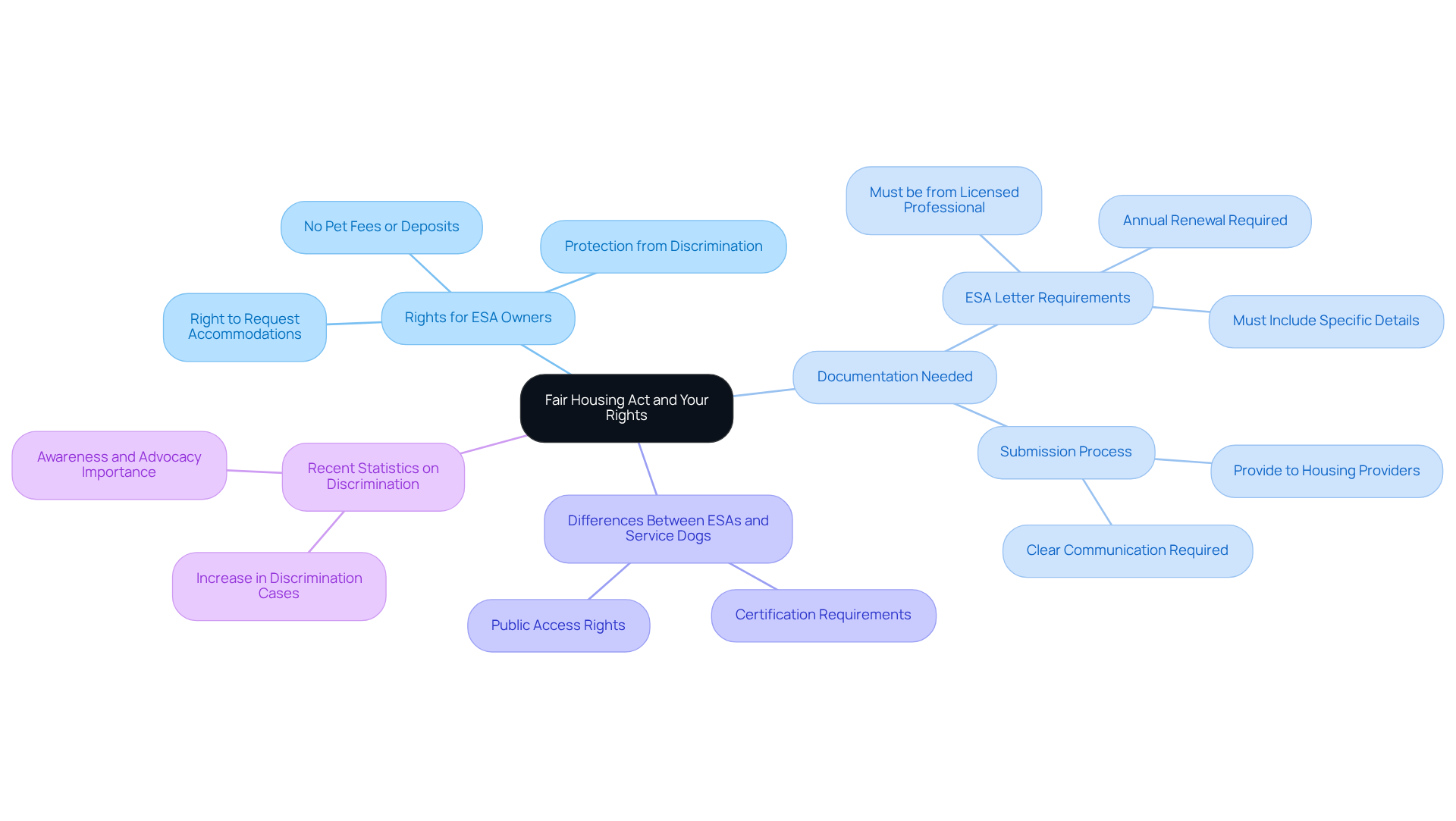
Identify Pet-Friendly Housing Options
Recognizing pet-friendly living arrangements is essential for individuals seeking accommodations for their emotional support animals. These beloved companions offer comfort to students with disabilities, alleviating symptoms related to their conditions. By allowing these animals in university housing, we promote equal opportunities for all students to enjoy a fulfilling residential life.
Begin your search by exploring popular websites like Zillow and Apartments.com, which feature filters specifically for pet-friendly listings. In fact, nationally, 55% of rental listings are advertised as pet-friendly, with cities like Dallas proudly showcasing 79% of their rental stock as welcoming to pets. This growing trend is significant, especially as 59% of renters reported having at least one pet in 2023, underscoring the increasing demand for pet-friendly rentals.
Engaging with local real estate agents who specialize in rentals can provide invaluable insights into available properties. These professionals often have access to listings that may not be widely advertised. For instance, a nearby real estate agent might share, “Many landlords are becoming more receptive to tenants with emotional support animals, especially as the need for pet-friendly rentals continues to rise.”
Furthermore, connecting within community organizations or participating in online discussions can lead to referrals for landlords who accept tenants with emotional support pets. For a more comprehensive search, consider utilizing dedicated platforms that focus on pet-friendly rentals. Websites like Rent.com and Apartment Finder can be particularly helpful. By embracing these resources and strategies, you can enhance your chances of finding a suitable home that welcomes your emotional companion.
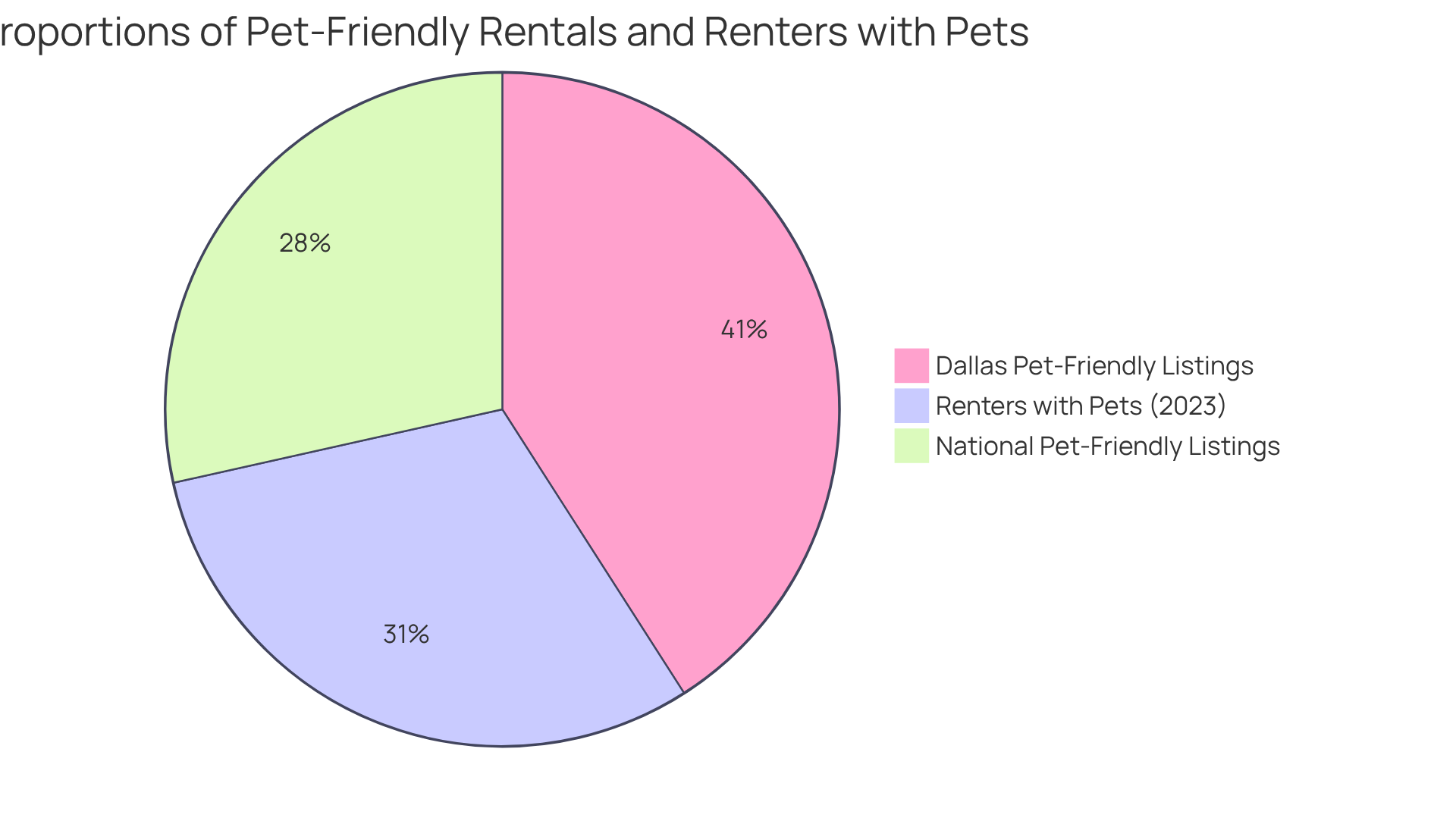
Gather Necessary Documentation for Your ESA
Navigating the challenges of mental health can be overwhelming, but living in ESA apartments can provide much-needed comfort through the support of an emotional support animal. To ensure accommodation for your ESA apartments, obtaining the necessary documentation is a vital step. A valid ESA letter from a licensed mental health expert is essential for securing ESA apartments, as it outlines the therapeutic necessity of your animal within your treatment plan. This letter should be clear and factual, confirming your recognized disability without delving into personal details. Keeping a copy of the Fair Housing Act (FHA) handy is also wise, as it offers legal protections and can be invaluable when discussing accommodations with landlords.
The time it takes to gather the required ESA documentation can vary widely, typically ranging from one day to several weeks, depending on your healthcare provider and state regulations. For example, in California, individuals experiencing homelessness can obtain an ESA letter in as little as one day. In contrast, other states may require a minimum relationship period of 30 days before a provider can issue the letter.
When preparing effective ESA documentation for landlords, it’s important to include specific elements:
- A clear statement of the mental health condition
- An explanation of how the ESA alleviates symptoms associated with that condition
- Confirmation that the letter is issued by a licensed mental health professional who has evaluated you
Mental health experts emphasize the importance of these letters, noting that they not only facilitate access to accommodations but also empower individuals to advocate for their rights under the FHA. As highlighted by the American Psychiatric Association, maintaining accurate records is crucial for allowing individuals with emotional support animals to live in pet-restricted environments without facing discrimination.
Wellness Wag provides a streamlined online process for obtaining legitimate ESA letters through telehealth services, making it simpler for individuals to secure the necessary documentation. In summary, possessing a valid ESA letter and understanding the latest criteria for ESA documentation are essential steps toward creating a supportive living environment in ESA apartments for your emotional assistance animal.
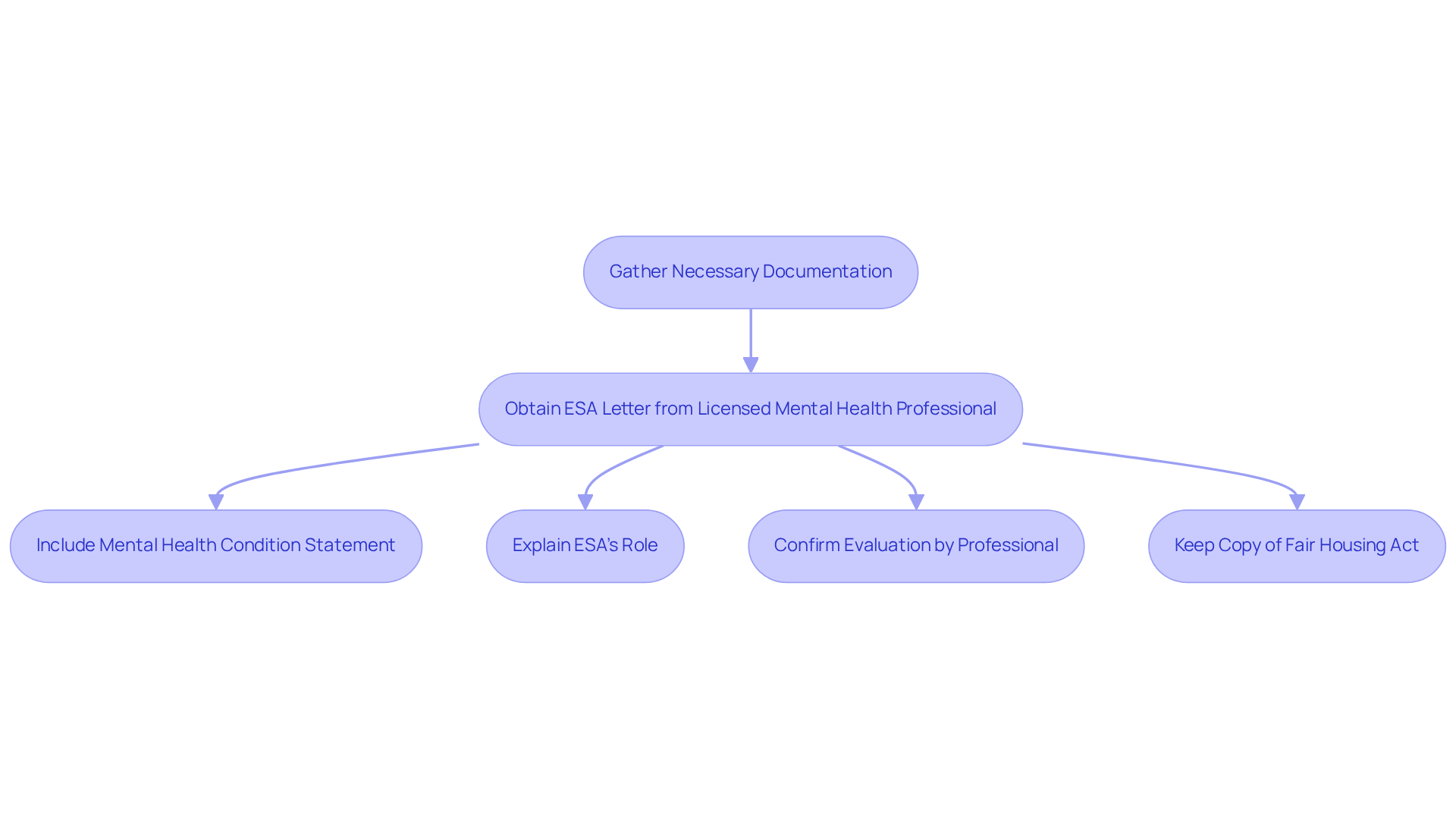
Communicate Clearly with Landlords About Your ESA
Effective communication is essential when discussing your ESA apartments and emotional support animal with landlords. It’s important to begin by being transparent about your need for an ESA and to present the necessary documentation, such as your ESA letter from Wellness Wag, known for its straightforward approval process. Clearly articulating how your ESA positively impacts your mental health and overall well-being can be powerful; studies indicate that 73% of ESA owners rate their pets’ effectiveness in improving mental health as eight or higher on a scale of ten. This personal connection can resonate with landlords, making them more open to your request.
Establishing a respectful and open dialogue fosters a positive relationship with your landlord, which is vital for successful negotiations regarding ESA accommodations. As advocates for accommodation stress, mutual respect and effective communication are the cornerstones of successful landlord-tenant relationships. By approaching the conversation with empathy and understanding, you can address any concerns the landlord may have while reinforcing the benefits of having ESA apartments in your living space.
Recent guidance suggests that being proactive in these discussions can significantly enhance your chances of obtaining accommodation. Be prepared to clarify the legal protections granted to ESAs under the Fair Housing Act, which mandates landlords to accommodate support animals. This knowledge not only empowers you but also demonstrates your commitment to maintaining a harmonious living situation. Additionally, it’s important to note that 70% of pet owners are unaware of how to get their pet certified as an ESA, highlighting a common barrier that can be addressed in your communication strategy.
Furthermore, landlords should understand that failing to grasp ESA laws can lead to significant financial repercussions; for instance, one property manager faced costs of $80,000 due to misunderstandings. By emphasizing the potential benefits of pet-friendly policies, you can create a more balanced view of the conversation, showcasing how accommodating ESAs can enhance tenant satisfaction and reduce vacancy rates. Ultimately, clear communication can bridge gaps and lead to successful outcomes in securing ESA apartments, supported by the compassionate approach of Wellness Wag.
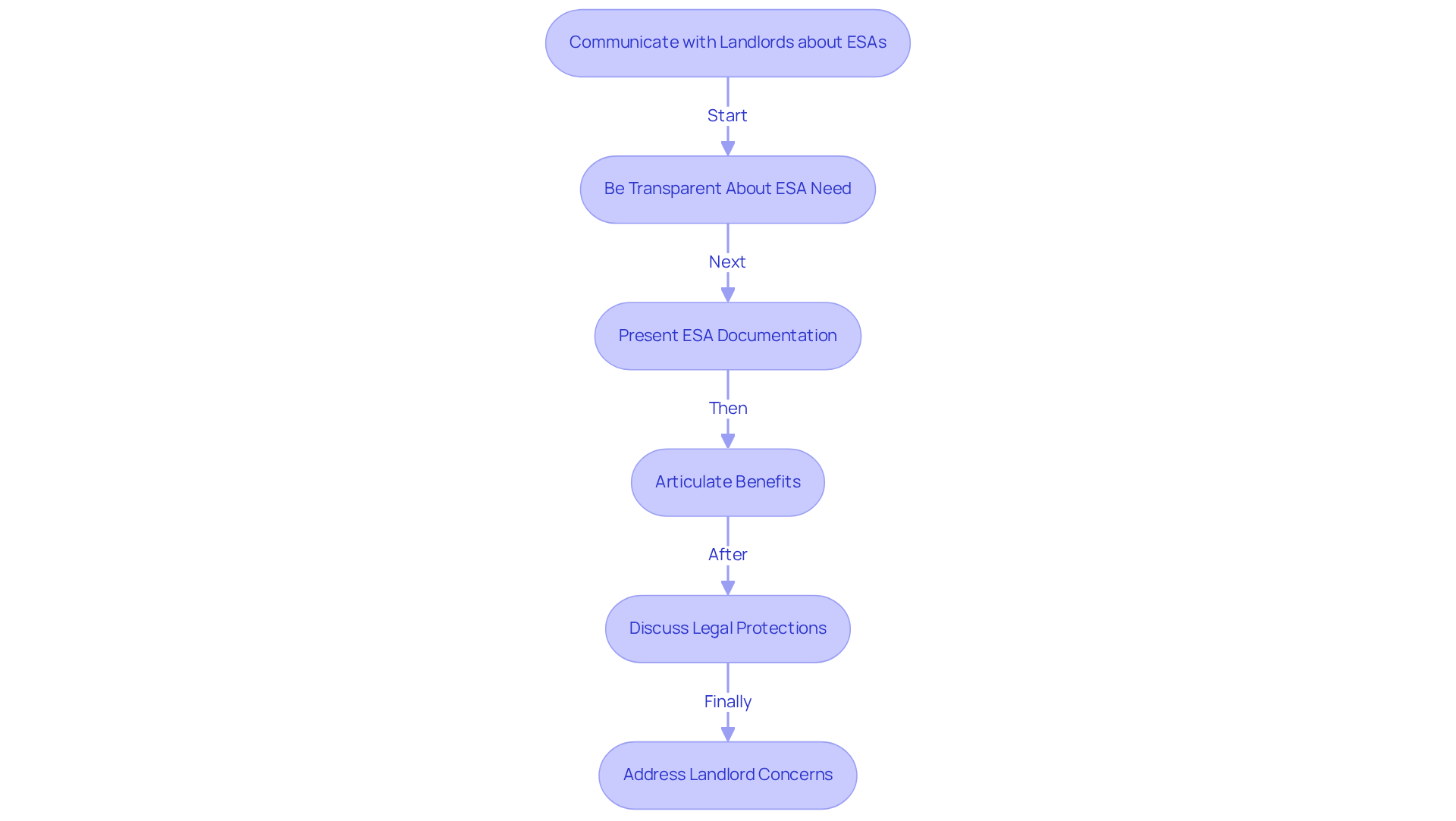
Research Local Laws on Emotional Support Animals
Navigating local laws regarding emotional support animals (ESAs) can be a daunting task, as regulations vary widely across jurisdictions. This inconsistency can create confusion and uncertainty for individuals seeking to understand their rights. Many individuals may feel overwhelmed by the additional protections some states offer or the specific requirements that others impose. It’s essential to take the time to research these regulations thoroughly. Legal professionals often recommend consulting local government websites or legal resources to gain clarity on what is permissible in your area.
Moreover, it’s important to recognize the legal rights of service dog owners, who enjoy full public access rights under the Americans with Disabilities Act (ADA). Service dogs are allowed in public spaces such as restaurants, shops, libraries, and public transit, and they have the right to live in housing situations where animals are typically prohibited. Understanding these rights is crucial when seeking accommodations, as it helps ensure compliance with local regulations and strengthens your ability to advocate for your needs.
Recent changes to ESA apartments regulations in various states highlight the necessity of staying informed, as these updates can significantly impact the rights of owners of ESA apartments. Unfortunately, statistics reveal that disability discrimination remains a prevalent issue, with a notable percentage of fair accommodation complaints linked to ESAs. By remaining aware of local laws and recent changes, individuals can better navigate the complexities of their ESA apartments housing rights and secure the accommodations they need. Remember, you are not alone in this journey; support is available to help you every step of the way.
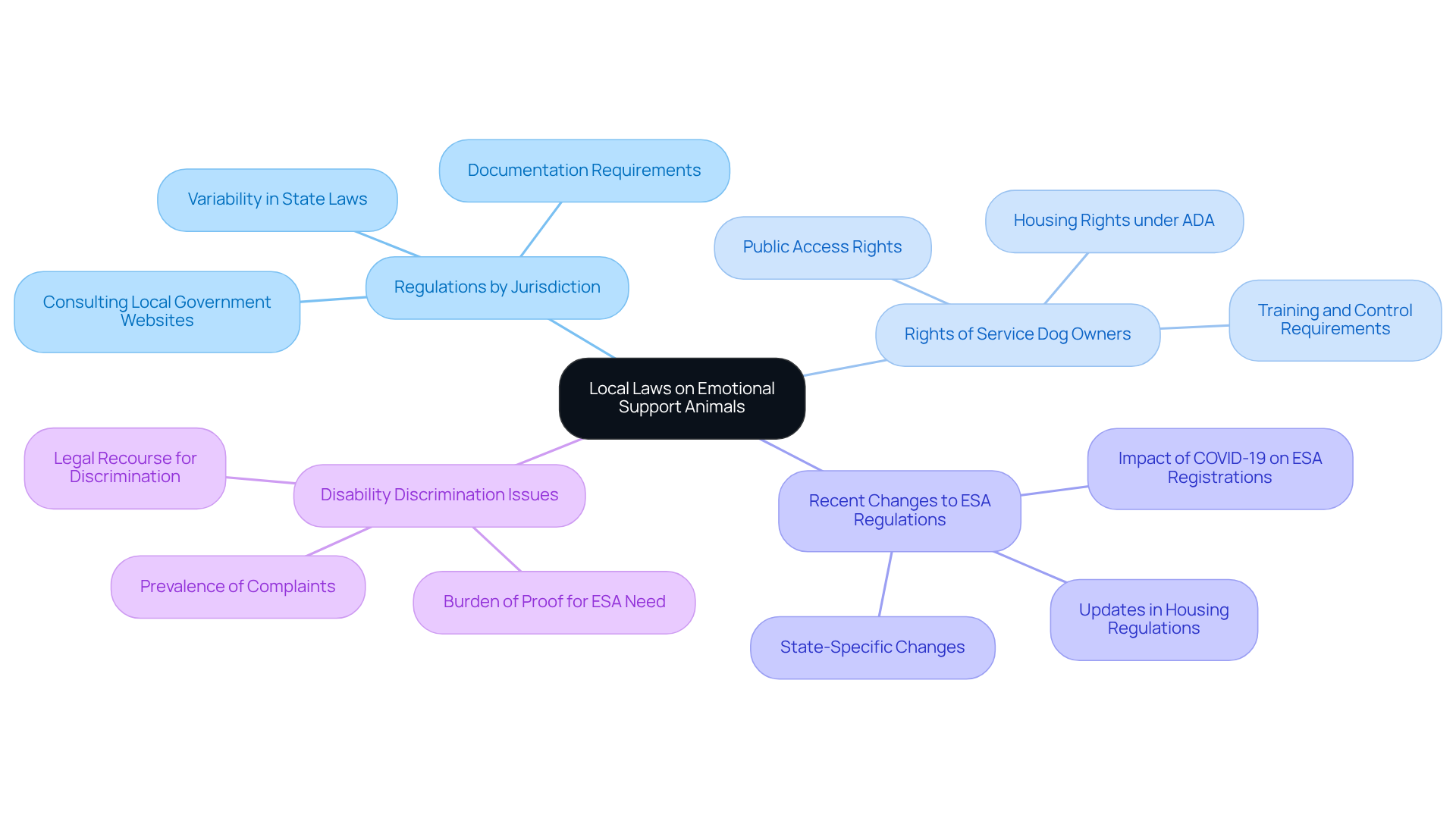
Differentiate Between Service Animals and Emotional Support Animals
Understanding the distinction between service creatures and emotional support companions (ESAs) is not just a matter of legal definitions; it’s a crucial aspect of ensuring that individuals receive the support they need.
Service creatures, specifically trained to assist individuals with disabilities, are protected under the Americans with Disabilities Act (ADA). This important law mandates that service creatures, primarily dogs, must be welcomed in public spaces and cannot be turned away based on ‘no pets’ policies.
On the other hand, emotional support creatures provide comfort and companionship but do not undergo the specialized training that service animals do. As disability advocate Paige Cerulli aptly points out, ESAs ‘don’t need to complete the intense training that service dogs perform, and they don’t have to fulfill specific tasks.’
This distinction is vital for individuals striving to communicate their needs effectively to landlords, ensuring that they understand the legal protections afforded to service creatures compared to the more limited rights of ESAs. Moreover, grasping these differences can help prevent confusion and foster smoother interactions in accommodation scenarios.
For instance, Harvard University accommodates ESA apartments for students with verified needs, fostering a nurturing living environment while also taking into account pet accommodations and the needs of those with allergies.
It is equally important to understand the specific steps involved in getting an ESA approved for university housing, along with the legal implications of the Fair Housing Act and Air Carrier Access Act for individuals with ESAs.
Lastly, the presence of counterfeit service dogs adds another layer of complexity, making it essential for individuals to be well-informed about their rights and the legitimacy of their assistance creatures.
Remember, you are not alone in navigating these challenges, and support is available to help you through this journey.
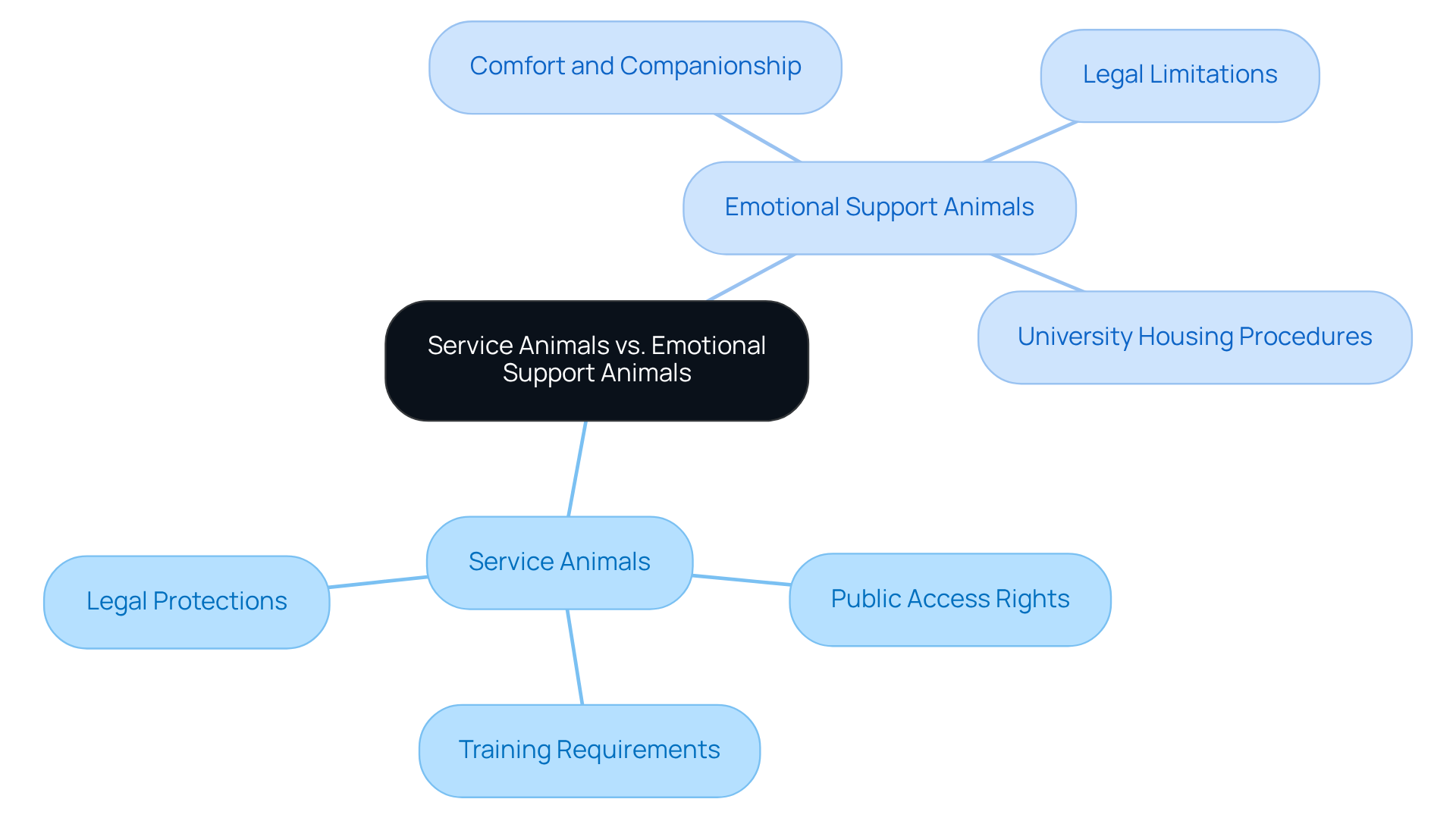
Explore Online Resources and Support Communities
For many emotional support animal (ESA) owners, the journey can be filled with emotional challenges that feel overwhelming. Fortunately, an abundance of online resources and supportive communities exists, providing invaluable guidance and shared experiences that can make a significant difference. Platforms like Reddit, Facebook groups, and specialized forums serve as nurturing spaces where individuals navigate the complexities of ESA accommodation together. Engaging with these communities not only offers emotional support but also practical advice on finding ESA apartments that are pet-friendly, fostering a sense of belonging and understanding.
Numerous organizations also provide essential resources outlining ESA rights and responsibilities, which are crucial for those seeking accommodation solutions. Many ESA owners express feeling empowered and relieved when they connect with others who truly understand their struggles. This highlights the profound significance of community in overcoming living challenges. As more assistance groups emerge to tackle ESA accommodation issues, the network of support continues to grow, offering hope and reassurance.
By utilizing these online resources, owners of ESA apartments can advocate for their rights more effectively and find suitable living arrangements that meet their emotional care needs. Remember, you are not alone in this journey; there are compassionate communities ready to support you every step of the way.
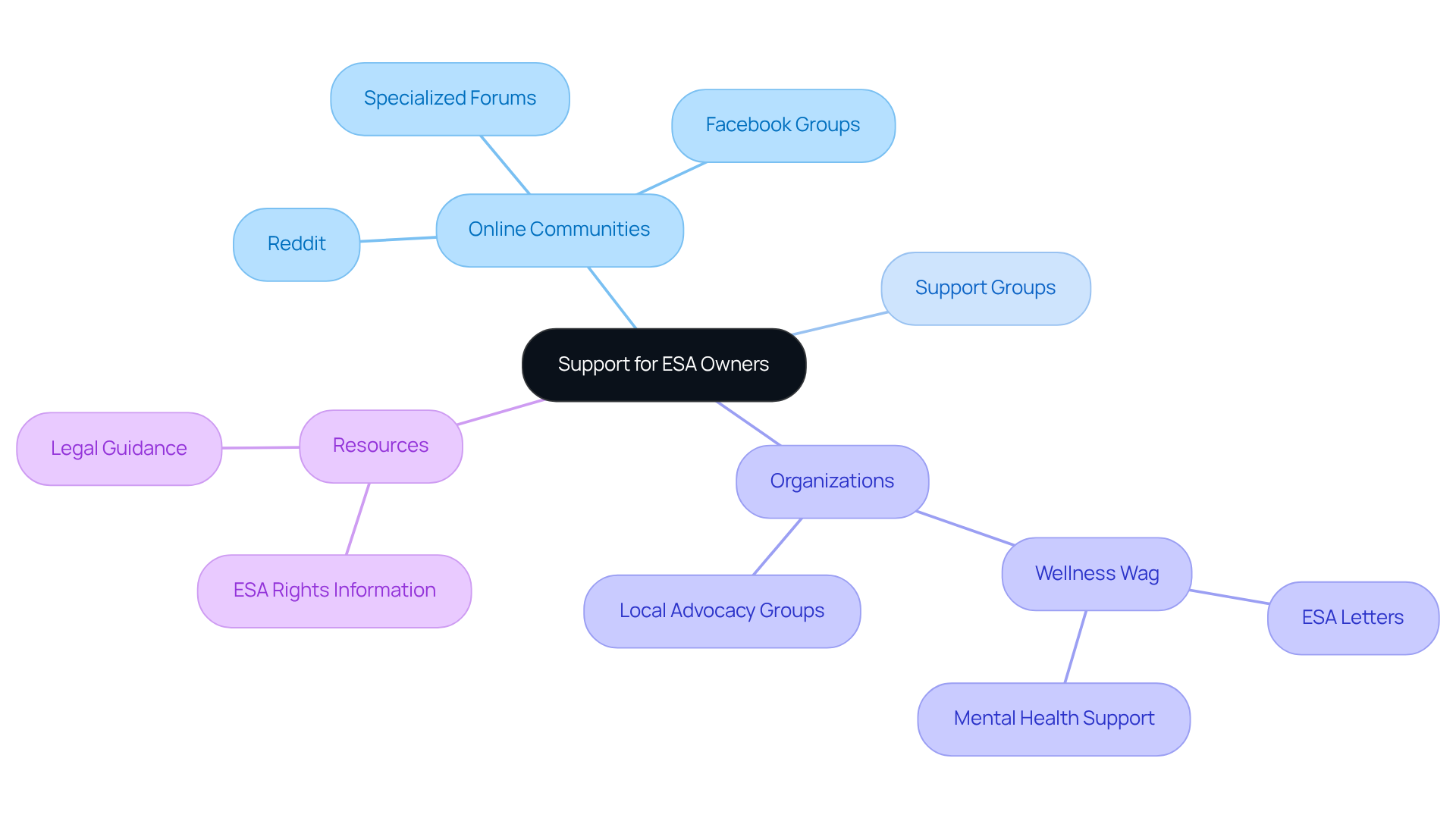
Prepare for Potential Landlord Objections
When seeking accommodations with an emotional support animal, it’s important to anticipate potential objections from property owners. Concerns often center around property damage, noise disturbances, and allergies, which can understandably cause anxiety for you. Research shows that 75% of renters have at least one pet, highlighting the need to address these issues proactively to foster a positive dialogue with landlords.
To ease these fears, consider offering a pet deposit or providing references from previous landlords who can attest to your responsibility as a pet owner. Furthermore, presenting a well-documented ESA letter from a licensed mental health professional can strengthen your case. Experts emphasize that open communication about your pet’s behavior and your commitment to maintaining the property can significantly enhance landlords’ willingness to accommodate your ESA.
Recent strategies for alleviating landlord concerns include:
- Using pet management software to streamline communication and ensure compliance with pet policies.
- Managing pet-related issues effectively.
- Showing landlords that you are proactive and responsible.
By preparing thoughtful solutions to common objections, you can improve your chances of finding ESA apartments that allow your emotional support animal.
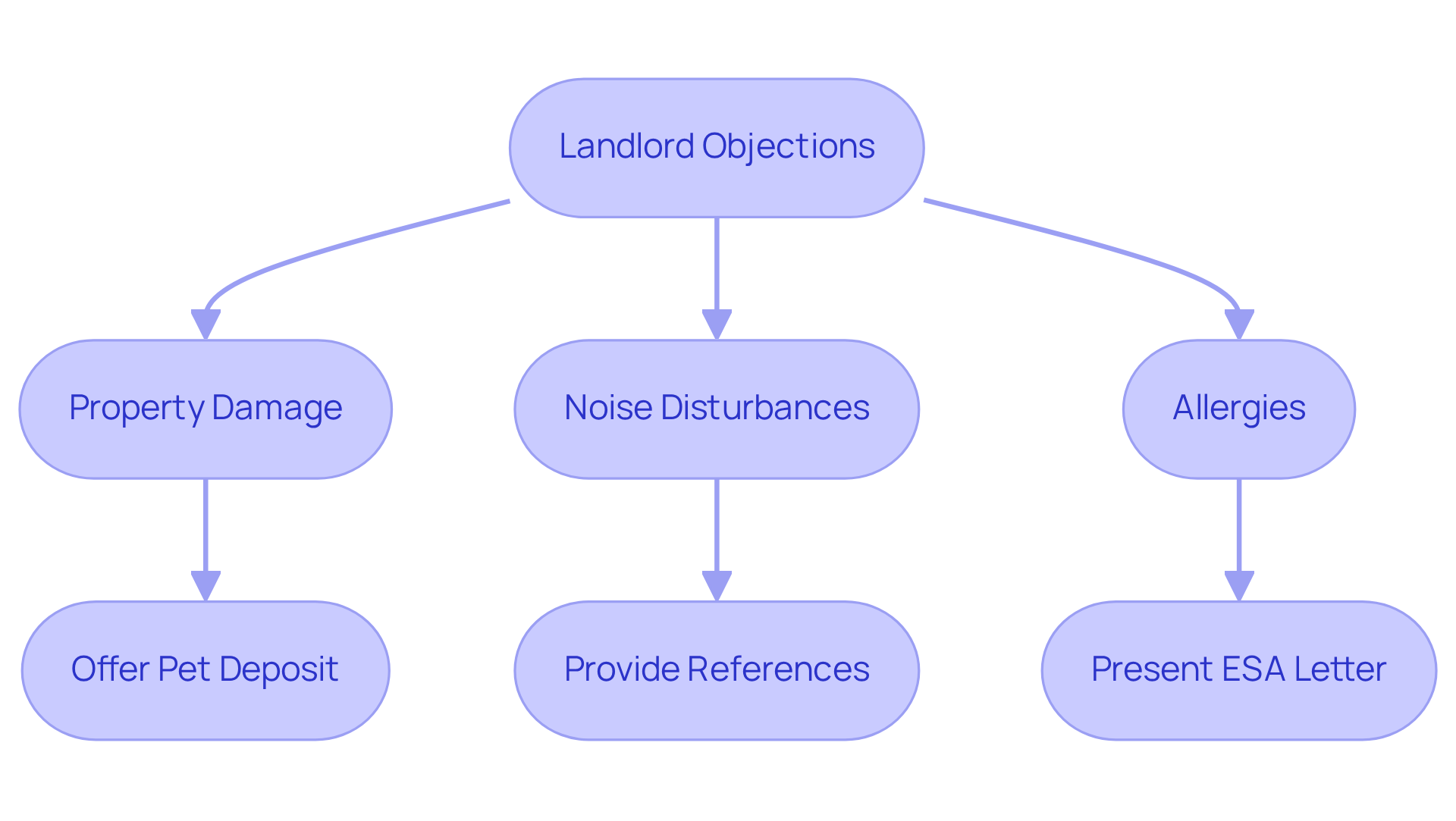
Conclusion
Navigating the complexities of finding suitable housing for emotional support animals (ESAs) can feel overwhelming. Many individuals face emotional challenges that can be exacerbated by the process of securing a home for their beloved companions. It’s essential to understand your rights, the regulations in place, and the practical strategies that can ease this journey. This article emphasizes the importance of being well-informed and proactive in securing ESA apartments, ensuring that you can live comfortably alongside your emotional companions.
The Fair Housing Act plays a critical role in protecting the rights of ESA owners. Having valid ESA documentation is not just a formality; it is a vital tool that empowers you in your housing search. Communicating effectively with landlords can also make a significant difference. Have you considered exploring pet-friendly housing options? Understanding local laws and engaging with supportive communities can enhance your chances of finding the right accommodations. Knowing the differences between service animals and ESAs further equips you in your housing journey.
Ultimately, securing ESA-friendly housing is about more than just finding a place to live; it’s about creating an environment that nurtures your mental health and well-being. By utilizing available resources, understanding your legal rights, and preparing for potential landlord objections, you can advocate for your needs effectively. Remember, you are not alone in this journey. Embrace the support of communities and organizations that share this mission, and take the necessary steps to ensure that your emotional support animal can be a cherished part of your home, enhancing your quality of life.
Frequently Asked Questions
What is Wellness Wag and how does it assist clients?
Wellness Wag is a service that streamlines the process of obtaining an Emotional Support Animal (ESA) letter for housing. Clients can receive their documentation within 24 hours after a brief assessment and consultation with licensed professionals.
Why is obtaining an ESA letter important for housing?
An ESA letter is essential for individuals needing emotional support animals as it allows them to assert their rights under the Fair Housing Act, ensuring they can live in ESA apartments without facing pet-related fees or discrimination.
What protections does the Fair Housing Act provide for ESA owners?
The Fair Housing Act prohibits landlords from denying residency based on a tenant’s documented need for an ESA. It also prevents landlords from imposing additional pet fees or deposits and from demanding detailed medical records or diagnoses.
How can tenants ensure they are aware of their rights under the Fair Housing Act?
Tenants can educate themselves about their rights under the Fair Housing Act to navigate potential challenges and avoid discrimination related to their emotional support animals.
How often should ESA letters be renewed?
ESA letters should be renewed annually to ensure compliance with accommodation requirements and to prevent conflicts with landlords.
What are the key differences between Emotional Support Animals (ESAs) and Service Dogs?
Service dogs must be trained and certified and have full public access rights under the Americans with Disabilities Act (ADA), while ESAs do not have such training requirements and lack the same public access rights.
How can individuals find pet-friendly housing options?
Individuals can search for pet-friendly housing by using websites like Zillow and Apartments.com, which have filters for pet-friendly listings. Engaging with local real estate agents and community organizations can also help identify available properties.
What is the current trend regarding pet-friendly rentals?
Approximately 55% of rental listings are advertised as pet-friendly, with some cities, like Dallas, having up to 79% of their rental stock welcoming pets, reflecting the increasing demand for pet-friendly accommodations.
Certify Your Emotional Support Animal Today

Why You Can Rely on Us?
At Wellness Wag, we believe your pet deserves care rooted in both science and compassion. Each article is carefully researched, written in clear language for pet owners, and then reviewed by qualified professionals to ensure the information is evidence-based, current, and practical for real-life care. Our goal is to help you feel confident in making informed decisions about your pet’s health and well-being.
Reviewed by
Angela Morris, MSW, LCSW
Angela is a licensed clinical social worker with 20 years of experience in patient advocacy and community mental health. She has assisted numerous clients with ESA evaluations and brings a deep understanding of disability accommodations, ensuring that all information is accurate, supportive, and practical.

Written by :
Lena Park
Last Updated :
July 11, 2025












